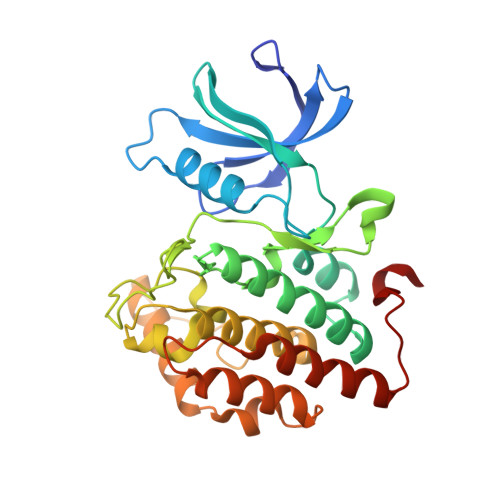Temperature-Sensitive Substrate and Product Binding Underlie Temperature-Compensated Phosphorylation in the Clock
Shinohara, Y., Koyama, Y.M., Ukai-Tadenuma, M., Hirokawa, T., Kikuchi, M., Yamada, R.G., Ukai, H., Fujishima, H., Umehara, T., Tainaka, K., Ueda, H.R.(2017) Mol Cell 67: 783-798.e20
- PubMed: 28886336
- DOI: https://doi.org/10.1016/j.molcel.2017.08.009
- Primary Citation of Related Structures:
5X17, 5X18 - PubMed Abstract:
Temperature compensation is a striking feature of the circadian clock. Here we investigate biochemical mechanisms underlying temperature-compensated, CKIŽ─-dependent multi-site phosphorylation in mammals. We identify two mechanisms for temperature-insensitive phosphorylation at higher temperature: lower substrate affinity to CKIŽ─-ATP complex and higher product affinity to CKIŽ─-ADP complex. Inhibitor screening of ADP-dependent phosphatase activity of CKIŽ─ identified aurintricarboxylic acid (ATA) as a temperature-sensitive kinase activator. Docking simulation of ATA and mutagenesis experiment revealed K224D/K224E mutations?in?CKIŽ─ that impaired product binding and temperature-compensated primed phosphorylation. Importantly, K224D mutation shortens behavioral circadian rhythms and changes the temperature dependency of SCN's circadian period. Interestingly, temperature-compensated phosphorylation was evolutionary conserved in yeast. Molecular dynamics simulation and X-ray crystallography demonstrate that an evolutionally conserved CKI-specific domain around K224 can provide a?structural basis for temperature-sensitive substrate and product binding. Surprisingly, this domain can confer temperature compensation on a temperature-sensitive TTBK1. These findings suggest the?temperature-sensitive substrate- and product-binding mechanisms underlie temperature compensation.
Organizational Affiliation:
Laboratory for Synthetic Biology, RIKEN Quantitative Biology Center, 1-3 Yamadaoka, Suita, Osaka 565-0871, Japan.
















